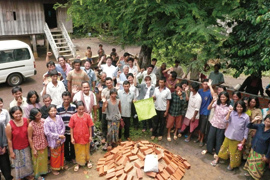The Mitsui & Co. Environment Fund
Introduction to Grant Projects
INDEX="499"
NAME="Introducing composting techniques to reduce the burning of crop residue in the Mekong Basin"
TYPE="活動助成,"
YEAR="2007年度,"
AREA="アジア,"
KIND="NPO,"
ORG="Institute of Environmental Rehabilitation and Conservation (ERECON)"
Institute of Environmental Rehabilitation and Conservation (ERECON)
Introducing composting techniques to reduce the burning of crop residue in the Mekong Basin
Activity grant
- Project Description
Environmental destruction is spreading through the Mekong Basin in forms such as the eutrophication of water sources caused by intensive single crop farming dependent on chemical fertilizers and pesticides, and a deterioration in soil quality due to the burning of crop residue. This project aims to prevent this destruction and build an environmentally-friendly, organic farming culture through activities such as organizing and educating farming communities, installing and operating composting and pelleting machinery, and managing model farms.
- Fields
- Preservation of biodiversity and ecosystem
- Grant year
- FY2007 Activity Grants
- Grant term
- 3 years
July 2007 - June 2010
- Grant amount
- 16,363,000 yen
- Activity region
- Thailand, Cambodia

Overview of the Organization

President
- Representative
- Dr. Machito Mihara,
President - Establishment
- 2000
- Establishment purpose
- ERACON was established to seek balance between human development and the natural environment in rural and urban areas and aims to contribute to making natural resource utilization more sustainable through environmental rehabilitation and conservation initiatives, and environmental education initiatives in countries throughout Asia, including Japan.
- Main areas of activity
- Thailand, Cambodia, Laos, Japan
- Staff
- 3 full-time staff members, 5 part-time staff members, and 141 full members
- Annual operating budget
- 18.90 million yen in 2005, 31.66 million yen in 2006, 55.74 million yen in 2007
- WEB site
- http://www.erecon.jp/
- Recent activities
- We are carrying out the following grassroots activities with the aim of balancing human development with the natural environment in Asia.
- (1) Environmental rehabilitation and conservation through tree planting and the introduction of agroforestry (Khon Kaen, Nan, Ranong, and Phang Nga Provinces, Thailand)
- (2) Building a sustainable agricultural industry in regions with saline soil (Khon Kaen and Ranong Provinces, Thailand)
- (3) Promoting environmentally-friendly, organic farming (Chiang Rai and Uttaradit Provinces, Thailand)
- (4) Investigating agricultural systems and soil fertility (Vientiane, Laos)
- (5) Propogating environmentally-friendly agriculture (Khon Kaen, Sukhothai, and Nan Provinces, Thailand; Cambodia; others)
- (6) Building systems to support food, agriculture and environmental education in Southeast Asia (Thailand, Cambodia, Japan)